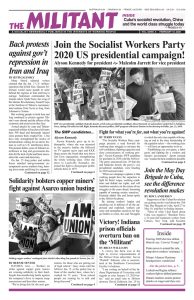February 13, 1995
ALLIANCE, Nebraska — Rail workers here face massive overtime demands by the bosses, which have been accompanied by the most significant hiring by the railroads in more than a decade.
Rail unionists are being forced to work for days and sometimes weeks on end without a day off. The shortage of train crews means many work an 8- to 12-hour shift and are called to return for another shift 8-10 hours later. This pattern can last for weeks. Many noted that it can lead to severe fatigue, which increases the risks of accident or injury.
The companies are also pushing to get new hires working as conductors and engineers as quickly as possible. Will Ford, a member of the United Transportation Union from Sheridan, Wyoming, said, “How can you promote new people to conductors in only 60 days without someone getting hurt?”
February 13, 1970
The 12-union coalition that held out for 14 long weeks against one of America’s most powerful corporations emerged victorious. For the first time in years, General Electric was unable to pit one union against the other to force contract settlements on its terms. This would in itself be a victory, without adding wage gains and fringe benefits totaling a reported $1.05 over three years.
This was a long bitter strike, with strikers in many states denied either unemployment compensation or welfare by pro-employer state governments. But the workers had support from the entire labor movement, something almost unprecedented in the past two decades.
A significant morale-building factor was the support that came from the student and antiwar movement. Students helped on picket lines and distributed leaflets urging a boycott of GE products.
February 10, 1945
The forces of capitalist reaction mobilized in their union-smashing drive under the leadership of Roosevelt and his General Staff jammed the May-Bailey slave labor bill through the House of Representatives. This measure would strip the labor movement of the most important social gains made in decades of struggle.
It provides that men between the ages of 18 and 45 who leave their jobs “without permission” of their draft boards shall be subject to a fine of $10,000 or 5 years imprisonment or both. The same penalties are applied to workers who refuse to accept jobs when they are commanded to do so by their draft boards. Workers can be shifted from one industry to another to work at lower wages. They can be sent from their homes to other cities with no provision made for moving their families or possessions.

